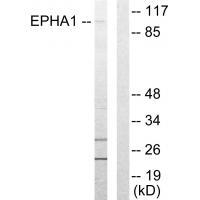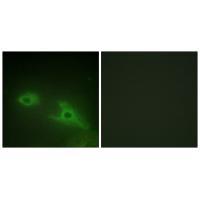

| WB | 咨询技术 | Human,Mouse,Rat |
| IF | 咨询技术 | Human,Mouse,Rat |
| IHC | 咨询技术 | Human,Mouse,Rat |
| ICC | 1/100-1/500 | Human,Mouse,Rat |
| FCM | 咨询技术 | Human,Mouse,Rat |
| Elisa | 咨询技术 | Human,Mouse,Rat |
| Aliases | EC 2.7.10.1; EPA1; EPH; EPHT; EPHT1 |
| Entrez GeneID | 2041; |
| WB Predicted band size | 108kDa |
| Host/Isotype | Rabbit IgG |
| Antibody Type | Primary antibody |
| Storage | Store at 4°C short term. Aliquot and store at -20°C long term. Avoid freeze/thaw cycles. |
| Species Reactivity | Human |
| Immunogen | Synthesized peptide derived from internal of human EPHA1. |
| Formulation | Purified antibody in PBS with 0.05% sodium azide. |
+ +
以下是关于EPHA1抗体的3篇代表性文献及其摘要:
---
1. **文献名称**:*EPHA1 signaling regulates neuroprotective effects in Alzheimer’s disease*
**作者**:Cissé M. et al.
**摘要**:研究利用EPHA1抗体揭示其在阿尔茨海默病中的作用,发现EPHA1通过调节β-淀粉样蛋白(Aβ)的清除通路减轻神经元损伤,为靶向治疗提供了新方向。
---
2. **文献名称**:*EPHA1 suppresses gastric cancer progression via inhibiting EGFR signaling*
**作者**:Liu Y. et al.
**摘要**:该研究通过免疫组化(EPHA1抗体)分析胃癌组织,发现EPHA1表达下调与患者预后不良相关。机制研究表明,EPHA1通过抑制EGFR信号通路发挥抑癌作用。
---
3. **文献名称**:*Targeting EPHA1 in glioblastoma using monoclonal antibodies*
**作者**:Wykosky J. et al.
**摘要**:开发针对EPHA1的单克隆抗体,体外实验显示其可特异性抑制胶质母细胞瘤细胞迁移和侵袭,提示EPHA1抗体在肿瘤靶向治疗中的潜力。
---
这些文献涵盖了神经退行性疾病、癌症机制及治疗应用,反映了EPHA1抗体在基础研究与临床转化中的多样性作用。
The EPHA1 antibody targets the Ephrin type-A receptor 1 (EPHA1), a member of the Eph receptor tyrosine kinase family. EPHA1 plays critical roles in cell-cell communication, guiding processes like cell adhesion, migration, and tissue patterning during development. It interacts with membrane-bound ephrin ligands, triggering bidirectional signaling pathways that regulate cytoskeletal dynamics and cell-cell boundary formation. Dysregulation of EPHA1 has been implicated in cancer, where it can act as both a tumor suppressor or promoter depending on context, influencing metastasis, angiogenesis, and drug resistance. Notably, EPHA1 is also linked to Alzheimer’s disease, with genetic studies associating EPHA1 variants with altered amyloid-β processing and neuroinflammation.
EPHA1 antibodies are essential tools for studying its expression, localization, and activation states in research. They enable detection via techniques like Western blotting, immunohistochemistry, and flow cytometry, aiding in the exploration of EPHA1's roles in health and disease. Therapeutic applications are emerging, with some antibodies tested for blocking aberrant signaling in cancers or modulating neurodegenerative pathways. However, challenges remain, including isoform-specificity and cross-reactivity issues, necessitating rigorous validation for experimental or clinical use. Ongoing research continues to unravel EPHA1's complex biology, positioning it as a potential biomarker or target for precision therapies.
×